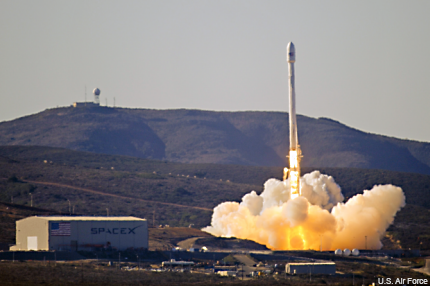Air Force certifies SpaceX launches for future contracts
The private space launch company is now qualified to compete for the Air Force’s EELV program.

Amid disputes over the length of the certification process and an ongoing court challenge to a contract award, the Air Force has certified the three successful launches required for SpaceX’s Falcon 9 launch system, according to a SpaceX announcement.
This means that the company is now qualified to compete for the Air Force’s Evolved Expendable Launch Vehicle (EELV) program, the Defense Department’s space launch program. SpaceX said it will meet the remaining certification requirements throughout the year.
SpaceX announced the certification late last week and the Air Force confirmed it Tuesday. “I applaud SpaceX on achieving the three flights,” Lt. Gen. Sam Greaves said in a statement to Quartz. “With this significant part of the agreed-to path in certifying the Falcon 9 v1.1 launch system complete, we look forward to working with SpaceX to complete the remaining certification activities and providing SpaceX with the opportunity to compete for EELV missions.”
Relations between the Air Force and SpaceX remain tense after the company’s court action against a contract awarded to United Launch Alliance, however.
“Generally, the person you’re going to do business with you don’t sue,” Gen. William Shelton, head of Air Force Space Command, said to Defense News in June, at a time when SpaceX CEO Elon Musk was publicly complaining that the certification process for the Falcon was unreasonably slow.
SpaceX filed a bid protest on April 28, challenging a long-term, sole-source contract for the purchase of 36 rocket cores from ULA, a Lockheed Martin and Boeing joint venture that has provided the military with space launches since 2006. The partnership between the two defense contractors has resulted in a defacto monopoly and lack of competition in the national security launch market, SpaceX says.
The Air Force responded by asking the federal court to dismiss the lawsuit, claiming that SpaceX—which was not certified at the time and could not bid on the rocket core contract—should not be able to protest a contract it did not participate in. Air Force lawyers also argue that the company moved too slowly—SpaceX failed to object to the original solicitation or at any point during the two years that was spent negotiating with ULA. SpaceX will have to respond to the motion to dismiss by July 31.
SpaceX, meanwhile, is continuing its work in launching commercial satellites. The company conducted the tenth consecutive successful launch of the Falcon 9, delivering a constellation of six ORBCOMM OG2 satellites into orbit on Monday. Originally scheduled for May 10, the launch suffered from a series of delays from problems such as payload integration and weather conditions, reports Forbes.
SpaceX was hoping to take the opportunity to test the reusability of the Falcon 9’s first stage, which can be reused in future launches to further lower costs, but recovery proved unsuccessful.
“Rocket booster reentry, landing burn & leg deploy were good, but lost hull integrity right after splashdown (aka kaboom),” Musk wrote on his Twitter account.
Meanwhile, the company also received Federal Aviation Administration approval to build a launch site for the Falcon in Cameron County. Texas.
NEXT STORY: Air Force mulls secretive sensor research center


